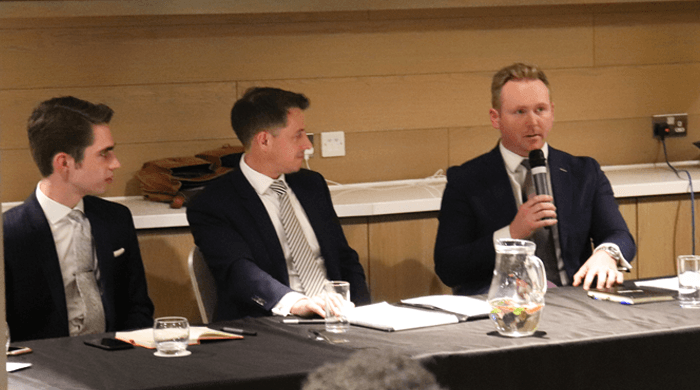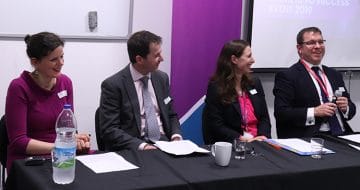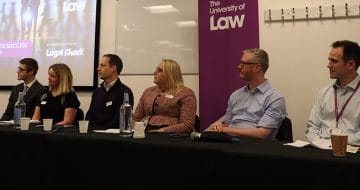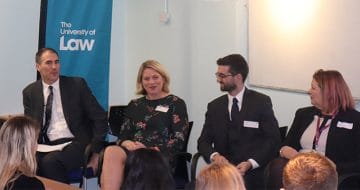Artificial intelligence is saving lawyers time, but it is also generating work

At last week’s student careers and commercial awareness event, ‘Law, innovation and technology’, which celebrated the upcoming launch of The University of Law’s new Nottingham campus, the message was clear: as with any industry experiencing advancing technology and increasing automation, the legal profession must adapt to changing client expectations. “Your clients want you to do things quicker and to do things cheaper than you ever have done before,” said panellist Simon McArdle, partner in Shoosmiths’ commercial team. “Everyone wants a cheaper legal bill,” added fellow panellist Adam Watson, a partner in Freeths’ real estate team.
Given how much lawtech can speed things up, as seen when software is applied to a large scale document review, this changing expectation is unsurprising. As McArdle explained, this typically lengthy task, traditionally undertaken by a large team of paralegals, can be quickened by using artificial intelligence (AI) software to conduct the initial review which Shoosmiths is introducing as part of its Spotlight contract review service. “You can take a hundred page contract, pump it through the AI and it will produce a report in under 30 seconds that would take a paralegal, working full steam, a full day, maybe a day and a half to work through,” he told an audience of 40 students.
Having such tools can be particularly handy when up against tight deadlines. William Preston, an apprentice solicitor in Eversheds Sutherland’s legal technology group, recalled a “stand out case study” in which AI was used in an impending $2.25 billion (£1.71 billion) corporate acquisition. Rather than manually review 5,000 contracts, the firm turned to AI for a quicker solution. “Through AI, we delivered on time, on budget and managed to do all this in less than seven days,” said Preston.
Tech also offers opportunity for greater collaboration among lawyers. For example, Idea Drop, Eversheds Sutherland’s Facebook-style innovation crowdsourcing app, allows lawyers to share, like and rate each other’s innovative ideas to improve client service. “It’s a very good way of getting everyone to have a say in how the business is run,” Preston explained.
Where tech often experiences teething issues, however, is in delivering accurate results — with lawyers often still required to check whether generated information is correct. “It’s a brain that you have to train and it will keep getting better and better and better the more contracts you pump through it,” McArdle added. For example, Watson pointed to a recent Freeths transaction in which AI reviewed 3,000 licence agreements. While only 30-40% were accurate on its first review, this figure rocketed to 70-80% towards the end of the transaction as the AI learned through greater exposure to data.
Even as machine learning will improve and require less supervision, the panel predicted its impact on a lawyer’s work-life balance to be limited. Although AI could save time in some respects, it is also likely to generate new types of work as large volumes of data can be analysed. Ultimately, AI will just be another tool to complement the work of lawyers, Watson said.
Instead, a greater challenge to a lawyer’s work-life balance is tech-enabled connected working. McArdle traced this back to the arrival of email twenty years ago — an exciting, but disruptive tech wave that the legal profession was forced to adapt to. Departing from a system depending on the postman to deliver your work, the use of email moved towards a “24/7 culture”, McArdle recalled. This culture persists today as “now more than ever you are always contactable as a lawyer”, he added.
A drawback of being easily contactable is the pressure to a lawyer’s mental health and wellbeing. “You do need to look after yourself and you do need to find a way of switching off at the end of each day and that’s only going to get more and more challenging as time goes by,” McArdle stressed.
Yet, it is through tech-enabled connected working that lawyers can enjoy an “enormous amount of freedom” in deciding where to lay their roots, said McArdle, who operates in Shoosmiths’ Birmingham office. For Preston, who’s also based in Birmingham, tech as basic as Skype ensures that lawyers across Eversheds Sutherland’s global offices — from Manchester to Hong Kong — can easily collaborate on projects together. This freedom is particularly evident in the decline of the London-centric model of legal practice, said Watson, who’s based in Freeths’ Nottingham office. Lawyers in regional firms all over the country can enjoy high quality work exported from the Capital without the drawbacks of City life — such as unaffordable housing and long working hours.
But how does tech affect what is expected of the next generation of lawyers? Although coding isn’t essential, it does help develop practical “algorithmic thinking” when breaking down a problem and using tech to achieve a solution, said Preston, who studied coding during computer science in sixth form. While there is merit to such specialist skills, McArdle urged aspiring lawyers not to forget about the “emotional intelligence” needed when winning and managing relationships with clients. “People still buy people and they will do for the foreseeable future,” he added.


